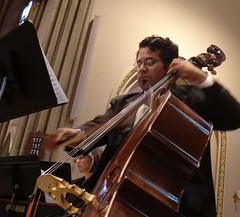- Vienna in the 1700's was like today's NYC; a capital of music and the arts.
- Emperor Joseph II, Vienna, was ruler of the Holy Roman Empire. He was an enlightened (knew the Rights of Man) despot (dictator) acting on a definite system for the good of all.
- emancipation of the peasantry
- spread of education
- the secularization of church lands
- the reduction of the religious orders and the clergy
- limited guarantee of freedom of worship,
- unity by the compulsory use of the German language
- abolished serfdom
- peasants must be paid in cash payments rather than labor obligations.
- a lover and patron of the arts.
These policies were violently rejected by both the nobility and the peasants, since their barter economy lacked money.
Antonio Salieri - a cosmopolitan composer who wrote operas in three languages.
- helped to develop many of the features of operatic compositional vocabulary; his music was a powerful influence on contemporary composers.
- also spent time writing works for opera houses in Venice, Rome, and Paris.
- one of the most important and sought after teachers of his generation and his influence was felt in every aspect of Vienna's musical life.
- among his famous pupils: Franz Liszt, Schubert, Ludwig van Beethoven.
Mozart's first great opera: The Abduction from the Seraglio, or the Harem, is a lighthearted piece in German.
Harem (Turkish, from Arabic حرم ḥaram 'forbidden place; sacrosanct, sanctum', related to حريم ḥarīm 'a sacred inviolable place; female members of the family' and حرام ḥarām, 'forbidden; sacred') refers to the sphere of women in what is usually a polygynous (as opposed to polyandrous) household and their enclosed quarters which are forbidden to men. It originated in the Near East and is typically associated in the Western world with the Ottoman Empire.
Libretto (pl. libretti), from Italian, is the diminutive of the word "libro" (book). A libretto is distinct from a synopsis or scenario of the plot, in that the libretto contains all the words and stage directions, while a synopsis summarizes the plot.
Thursday, September 8, 2011
Subscribe to:
Post Comments (Atom)





No comments:
Post a Comment